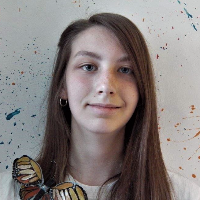Everything About Miss Peregrine’s Home For Peculiar Children That The Film Didn’t Tell You
Miss Peregrine’s Home for Peculiar Children is a quirky, fantastical tale about Jacob Portman, a teenager from Florida who discovers he is not as ordinary as he thought.
After Jacob’s grandfather dies in his arms, Jacob is left traumatised and haunted by his final words: "...find the bird in the loop on the other side of the old man's grave on September 3rd, 1940 and tell them what happened."
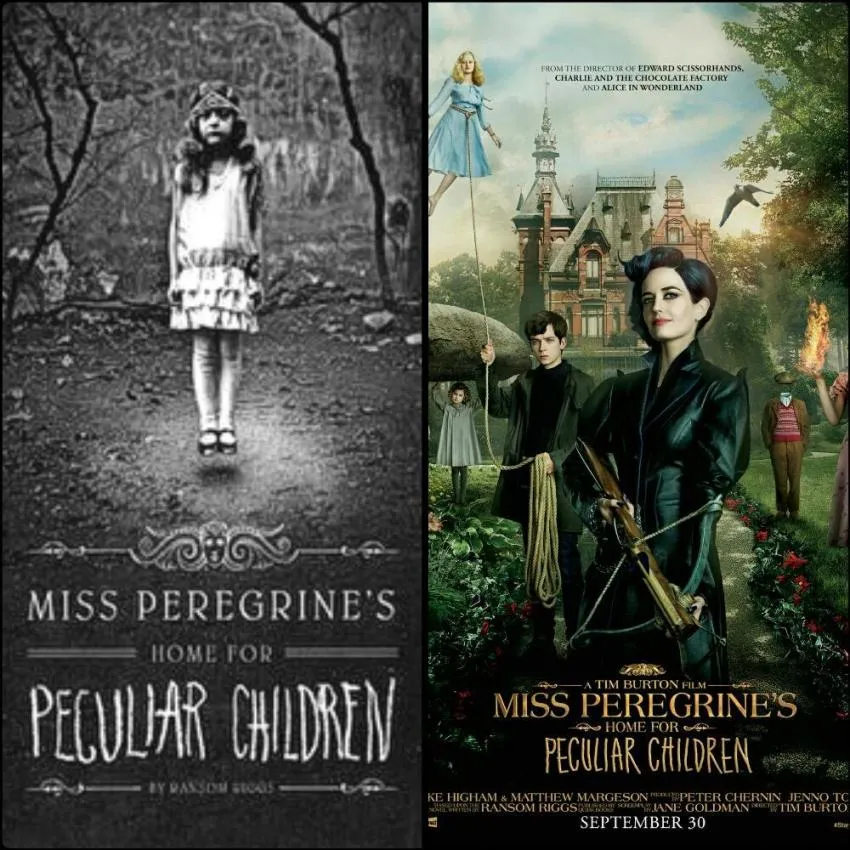
When Jacob finally finds a clue that might resolve the mystery surrounding his grandfather’s final message, Jacob is encouraged by his therapist to travel to his grandfather’s childhood home in Wales to attempt to gain closure.
What Jacob finds instead is proof that the fairy tales his grandfather used to tell him were true and the peculiar children actually exist.
Inspired by the novel by Ransom Riggs, Miss Peregrine’s Home for Peculiar Children was adapted into a film by Tim Burton in 2016, based on a screenplay by Jane Goldman.
However, the film is a far cry from the original story, with many of the details of Peculiardom and the characters being left out or changed as it was converted for the big screen.
As a stickler for the details, I have compiled a list of the features that were absent or changed in Tim Burton’s adaptation.
1. Jacob is a social outcast even before his grandfather’s death
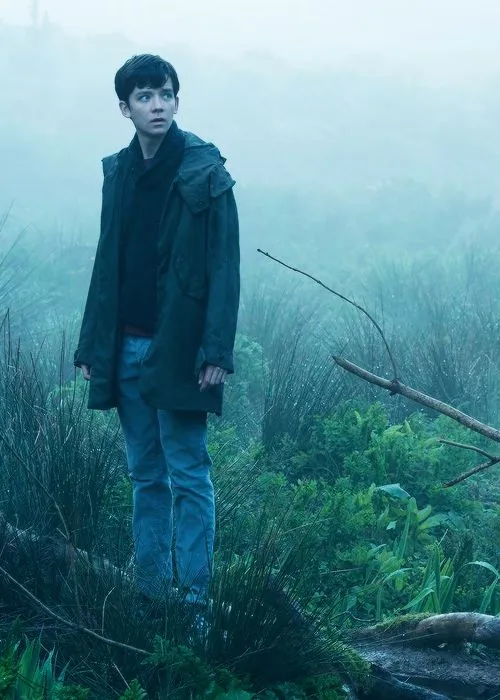
It’s not really shown in the film, but even before all the peculiar incidents start occurring around Jacob he isn’t exactly accepted by his peers. When he was younger he was made fun of for believing the ‘fairy tales’ his grandpa told him (causing him to distance himself from his grandfather), and in high school, he has to rely on a delinquent kid called Ricky to protect him from bullies.
He also has a hard time at home amongst his family, there is tension between his parents and pressure on him to uphold the family tradition and work at Smart Aid: a chain of general stores that his family own and a company he will inherit someday.
In order to avoid this tradition, Jacob spends all his time at Smart Aid attempting to get himself fired by causing trouble in the store and for his co-workers, making him an outcast at work as well. So the lovely Shelley you see in the film is unfortunately absent from the book, replaced with a more uptight, unsympathetic Shelley instead.
2. Jacob is much more traumatised in the book
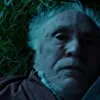
A major plot point at the beginning of the film is poor Jacob going to his grandfather’s house and discovering his grandpa severely injured and dying in the woods. While waiting for aid, Jacob catches sight of a monstrous creature in the darkness, prompting his parents to send him to a therapist.
This is a major plot point in the book as well, with Ransom Riggs taking more time with it to go more in-depth with the psychological after-effects Jacob suffered than Tim Burton does.
The death of Jacob’s grandpa is also more graphic, whereas in the film the only visible injuries grandpa Portman has are his missing eyes, in the book it is specified that one of his arms was ‘twisted beneath him as if he had fallen from a great height’ and his undershirt was ‘soaked with blood’ that was still warm. He is described as having gashes across his torso that were ‘wide and deep and clotted with soil;’ a horrendous way to go.
This and the creature Jacob sees cause him to always be on edge, suffering from panic attacks, plagued by guilt and nightmares so bad he has to wear a mouthguard to prevent him grinding his teeth. He becomes too scared to leave the house (not even for the funeral) and takes to sleeping in the laundry room as it’s the only room in the house without windows and a door that can be locked from the inside.
However, with Dr. Golan’s therapy Jacob is slowly convinced that the creature is just a figment of his imagination and becomes well enough that when he finds the letter from Miss Peregrine he wants to try and find her, leading him to his discovery of the time loop and the peculiar children.
3. The ages of the peculiar children are different in the film
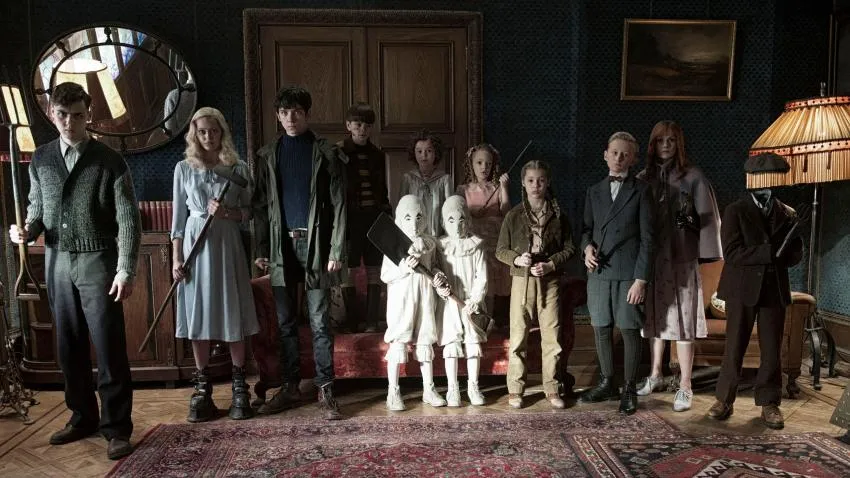
This should probably be classed as ‘appearances’ rather than ‘ages’ as all the peculiar children are technically at least 60-80 yrs old, but they still look and act like their physical ages (albeit it a little more mature than most kids I know), so we’ll stick with age for now.
While both Emma (Ella Purnell) and Jacob (Asa Butterfield) are portrayed as around 16yrs old like they are in the book (though Emma’s actual age is 88), most of the other children at Miss Peregrine’s home are either aged up or down for the film.
Bronwyn: Bronwyn Bruntley is played by Pixie Davis who was around 10 yrs old when Tim Burton’s film was released; however in the book, Bronwyn is physically about 15yrs old, with a real age of 80.
Olive: Olive Abroholos Elephanta is physically 6yrs old in the book with a real age of 75 (and a half!), but in the film, she is aged up. Played by Lauren McCrostie, she is portrayed as being around the same age as Jacob and Emma (16-17).
Enoch: Similarly, Enoch O’Connor is played by Fin Macmillan who is the same age as fellow cast member Lauren and also portrays Enoch as being around 17. In the book, however, Enoch is only 13 physically and 118 overall (though in the film he’s 112 for some reason).
Fiona: On the other hand Fiona Frauenfeld, who does look 16 in the book, has a reduced age of about 13 in the film (played by Georgia Pemberton). She is actually one of the oldest children in Miss Peregrine’s loop with an estimated real age of no more than 190yrs.
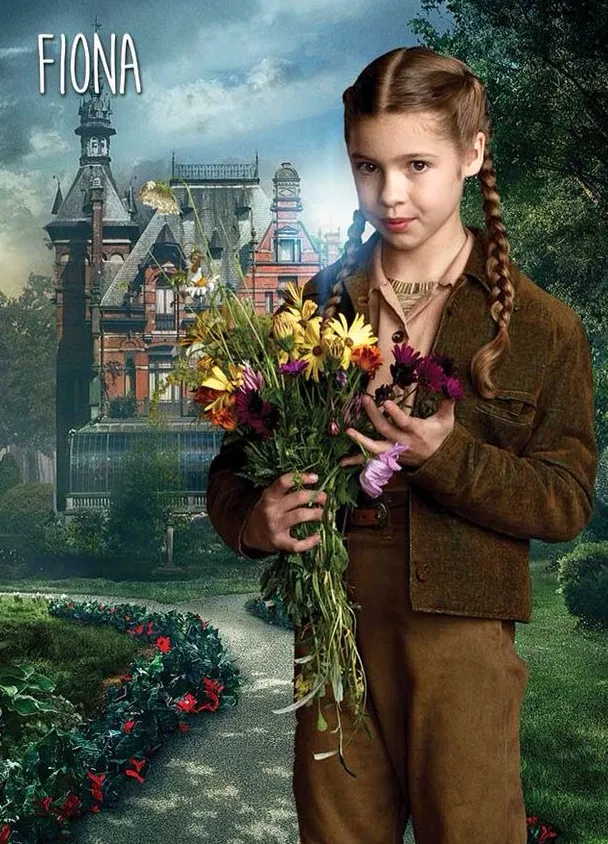
Hugh: The other oldest child is Hugh Apiston, who is also no more than 190 years old with the appearance of a 16yr old. In the film, though, Hugh is played by Milo Parker who was about 14 at the time.
Millard Nullings, Horace Somnusson, Claire Densmore, and the Twins all have the same physical appearances in both the film and the book (though with Millard it’s impossible to tell, I guess), but have real ages of 86/87, 83, 80, and unknown respectively.
4. The Peculiar Children’s Personalities are Changed in the Film
As well as their ages, the traits and behaviours of Miss Peregrine’s wards are altered by Tim Burton and Jane Goldman. The biggest changes were made to Emma and Olive, but that's a whole other talking point to get into, so I’ll save that for now and focus on the others.
The changes could be a consequence of the decisions to make some of the children older or younger, or to better show off their peculiarities, or just because they thought it would be more entertaining for viewers that way. Whatever the case it creates lots of points of comparison, but also means some of their backstories are missed out as well.
Bronwyn: While in the film Bronwyn doesn’t say a lot, in the book she is constantly looking out for her friends trying to make sure they don’t do anything stupid, and plays a big part in fighting off a Hollowgast and saving Miss Peregrine from the Wights.
Enoch: Though Enoch’s personality is pretty similar in the film and the book, his accent certainly isn’t. Possibly because Fin Macmillan is from Glasgow, the Enoch in Tim Burton’s adaptation is Scottish, but in the book, he has a cockney accent and is originally from East London.
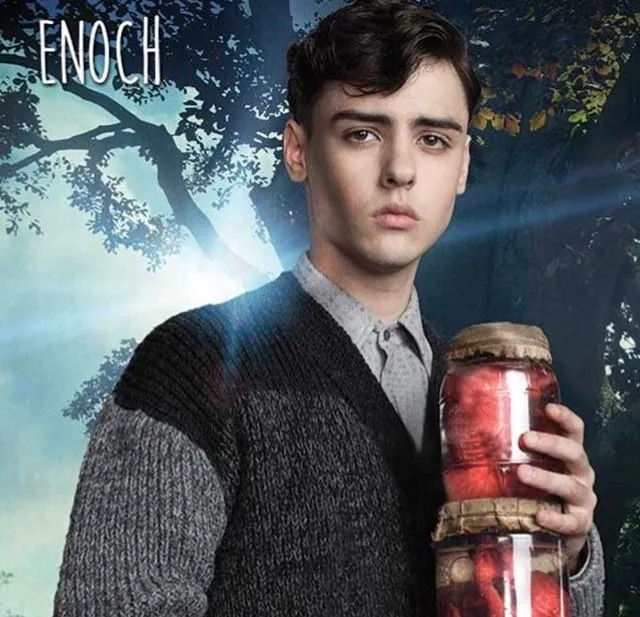
Due to his younger age in the book, he is also a bit more immature; he plays pranks on Jacob, trying to get him in trouble, and dreams of bringing to life an army of soldiers that will do his bidding. His ambitions are sort of fulfilled in the film as changes in the plot result in Enoch reanimating some skeletons to fight the Hollowgast.
Fiona: Another character who has a different accent in the book. Fiona is originally from Ireland and is said to have such a thick Irish accent that the others can barely understand her, not that you would really know as she rarely says anything.
This is very different from Georgia’s peppy portrayal of her in the film. Fiona is also much more wild-looking than her on-screen counterpart who has neat plaits and clean clothes, book Fiona has a nest for hair and her clothes are always covered in dirt or torn.
Hugh: Like Fiona, Hugh is physically 16 in the book, so he is more mature than in the film, in fact rather than Olive and Enoch having feelings for each other, it is actually Hugh and Fiona who are going out! With his bees and Fiona’s flowers I’d say they’re the perfect match, wouldn’t you?
Millard: Although Millard of the book is quite similar to his on-screen counterpart personality-wise, you will very rarely find him donning as many clothes as you see in the film. Obviously, for a visual medium, you do need some kind of indicator to know Millard’s in the scene, but in the book, he is nearly always in the nude!
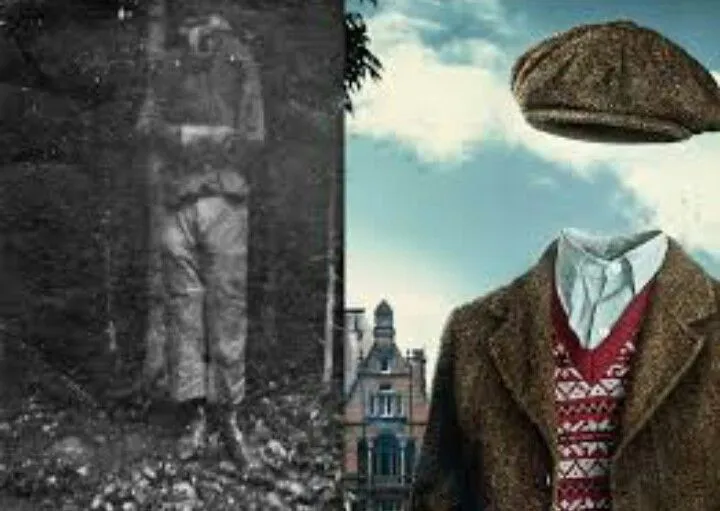
This fact irks Miss Peregrine and the other children constantly, with Millard having to be reminded that ‘Polite persons do not take their suppers in the nude!’ (p. 165).
Horace: Just like the film, book Horace is very dedicated to fashion and always makes sure his suits look clean and elegant. However, his peculiarity is not quite as fun as Tim Burton makes it out to be.
In the film the children enjoy movie nights, sitting down with a mug of hot chocolate and watching projections of Horace’s prophetic dreams; in the book though, Horace’s visions are much less fun, usually coming in the form of nightmares Horace often wakes up terrified and screaming.
Claire: Claire is a little shyer about revealing her peculiarity than in the film, refusing to eat in front of Jacob until the others pressure her into showing off her second mouth−even then she’s not happy about it.
The Twins: The Twins are just as mysterious as they are in the film, never uttering a word and keeping their faces covered. Although in the film they lift their masks for a moment and turn a Wight to stone with gorgon-like abilities, in the book their peculiarity is not revealed. Though it’s rumoured that they might have reptilian-like skin and scales, nothing is confirmed.
5. Emma is Olive and Olive is Emma

Aside from switching minor characters like Worm and Dylan, and omitting Ricky and replacing him with Shelley, the most obvious and major character change is the swapping of Emma and Olive’s peculiarities and the differences in their personalities.
In Ransom Rigg’s tale, Emma has a fiery, and occasionally volatile personality, which is quite appropriate as her peculiarity is the ability to create and control fire. She’s even able to change the flames’ colours. Contrastingly, Olive has a bubbly personality and the ability to levitate, though she can’t control it very well and has to wear heavy iron shoes and be strapped to her chair at mealtimes, so she doesn’t float away.
In the film, it is Olive who controls fire and Emma who can levitate. More than that, Emma is able to control air, blowing all the water out of a sunken ship and creating bubbles that allow Jacob and the others to breathe underwater, something book Olive cannot do. In the film, Olive is anything but fiery, she allows herself to be treated badly by Enoch and is shy and quiet, though she still protects her friends when she needs to.
6. Millard has a record of everything that happens on September 3rd, 1940
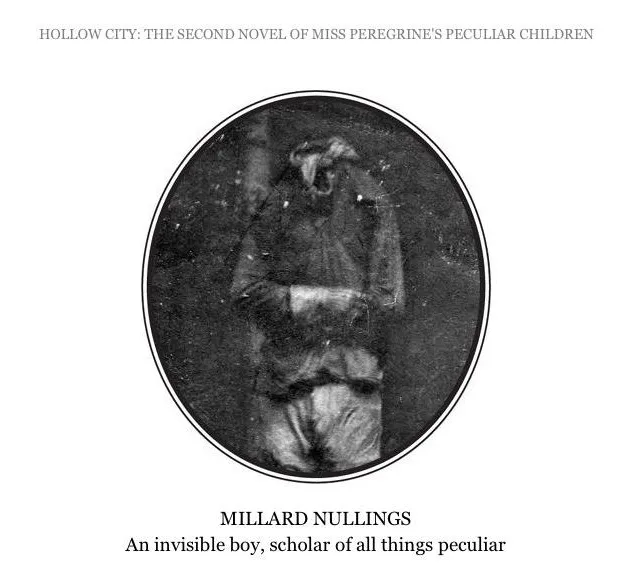
Something that comes into use multiple times throughout the novel is Millard’s book, an extremely detailed document containing nearly everything that happens on September 3rd, 1940, the day of their loop (in the film their loop was made in 1943, instead). ‘Every action, every conversation, every sound made by each of the one hundred fifty-nine human and three hundred thirty-two animal residents of Cairnholm, minute by minute, sunup to sundown (p. 196-7).’
By the time Jacob meets him he has spent 27yrs working on it (he spent three years on pigs alone! – Hugh, p.197) and still hasn’t quite finished. Unfortunately, the book doesn’t exist or at least isn’t mentioned in the film.
7. There are technical terms for peculiar beings
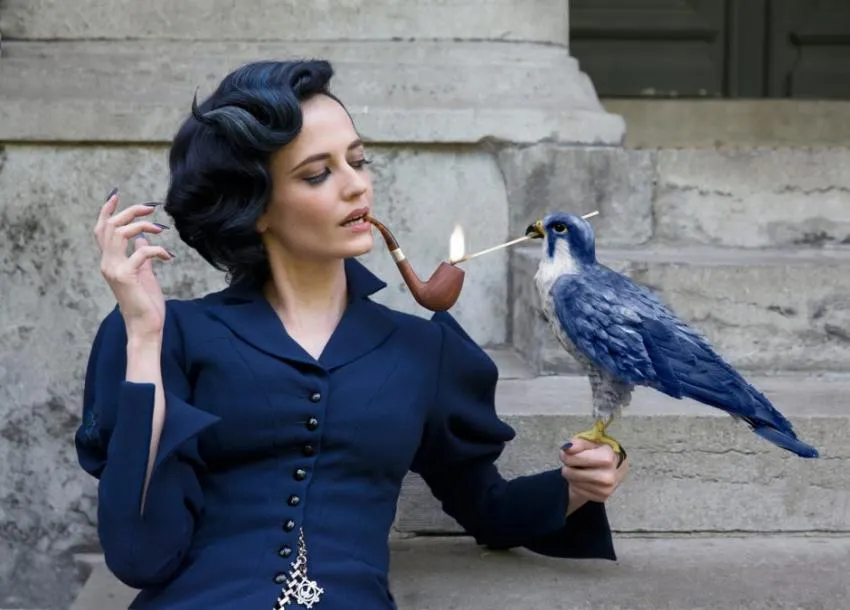
The scientific term for someone who is peculiar is Syndrigast, meaning ‘peculiar spirit’ in the Old Peculiar Language (which Riggs based on Old English); Ymbrynes like Miss Peregrine and Miss Avocet is a subset of Syndrigast who can manipulate time and transform into birds, their name means ‘revolution’ or ‘circuit’ in Old Peculiar.
The Syndrigast who tried to gain immortality and defy death is known as Hollowgast (Hollows for short) appropriately meaning ‘empty spirit), and if a Hollowgast eats enough Syndrigast souls (usually children’s!) they turn into a Wight and regain their human form and the ability to think beyond animalistic desires.
However, they can never get back the irises and pupils of their eyes and are simply left with white orbs, hence why peculiars elected to call them Wights.
8. Hollowgast can’t enter loops, but Wights can!
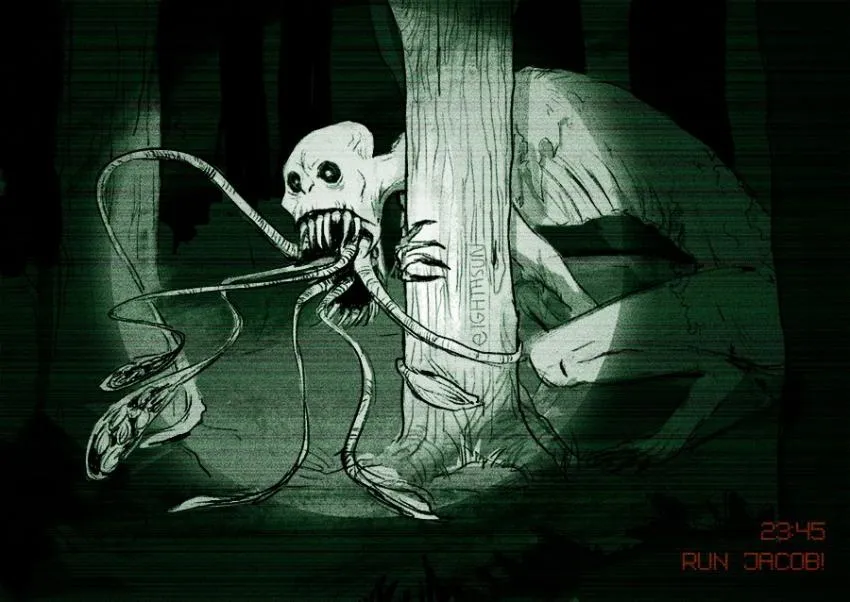
While the films seem to suggest that Hollowgast is able to enter time loops, in the book this is impossible.
They are also not as giant as Tim Burton portrays them, they are closer to the size of a human, but with razor-sharp teeth, tentacles instead of tongues, and the awful stench of decaying flesh hanging around them (I guess eating children gives you bad breath).
Additionally, Hollowgast doesn’t just pluck out people’s eyes when they attack them, they eat everything (at least they’re not wasteful, right?)
9. Wights don’t have any special powers
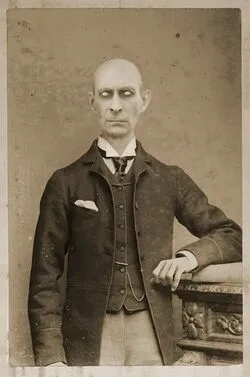
Contrary to Tim Burton’s vision of Wights being able to shapeshift and use their bodies as weapons, in the book it is revealed that Wights don’t have any special powers at all aside from being able to enter loops. Instead, Wights have to use their cunning and intelligence to figure out where loops are and trick peculiars into leaving them so they can be consumed by the Hollowgast.
Examples include the Wight posing as Jacob’s therapist Dr. Golan and a couple of Wights who posed as members of the Council of Ymbrynes and lured Miss Avocet’s wards out of the safety of their loop.
10. Dr. Golan is just a lackey
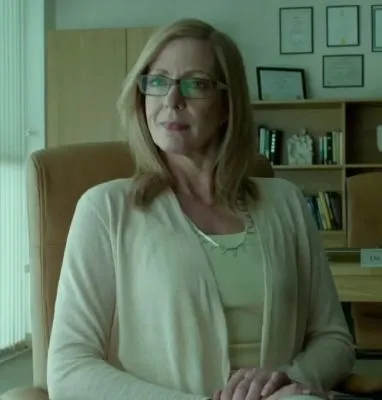
In the film, Dr. Golan is revealed to be Mr. Barron, the leader of the group of dissenters who carried out a failed experiment to gain immortality and consequently turn into Hollowgast. His aim is to recreate the experiment on a much larger scale by kidnapping Ymbrynes and forcefully using their powers.
In the book, Dr. Golan is just one of the many Wights wanting to become human again and so attempts to abduct Miss Peregrine and Miss Avocet. After battling the older peculiar children, he is ultimately shot by Jacob before falling from the lighthouse.
The leaders of the rebel group are actually Miss Peregrine’s two brothers who were brought up among Ymbrynes and thought they could harness their power to live forever, convincing others to join them.
11. Jacob kills a Hollowgast alone
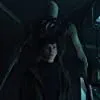
There are some great displays of camaraderie and teamwork in Tim Burton’s film, as the peculiar children, all come together to rescue Miss Peregrine and stop the Wights’ plan to recreate the experiment. This is true in the book too, however, one heroic act is carried out alone and that is Jacob’s killing of a Hollowgast.
While the Hollowgast aren’t as big in the book as they are in the film, they are still horrific monsters to try and fight, especially when you don’t have a peculiarity suited for combat, or any training whatsoever−like Jacob. However, armed with only a pair of shears that is exactly what Jacob does, luring the monster away from Emma and managing to defeat it in a bog no less! −that’s no mean feat.
It's a real turning point for Jacob, as he gains more confidence and starts to adopt a more established leadership role within the group.
12. The book doesn’t exactly have a happy ending
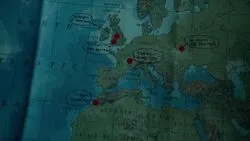
The film wraps up quite nicely with the Hollowgast and Wights beaten, Miss Peregrine rescued, and a boat to replace their old loop, everything seems to be looking up for the peculiar children. Jacob is even able to reunite with Grandpa Portman again that's right he’s no longer dead. This is not the case in the book (sorry about that).
While the children manage to rescue Miss Peregrine (at least they think they have), she is unable to return to human form and make a new loop. This means the children are alone. They resolve to try and find another Ymbryne to help them, but to do that they’ll have to travel through different loops.
Hopping between loops can be risky, especially if they’re loops made after 1940 as time will start to catch up to the peculiar children and they’ll start to age rapidly if they stay there too long.
Jacob also had to make the decision to help the children and leave his family behind, the possibility that he may never see them again looming over him (so yeah, he definitely doesn’t get to reunite with his grandpa, sorry Burton). The ending is pretty dire, but it’s a brilliant setup for book two, Hollow City, right?
While it doesn’t seem like there are going to be any more Miss Peregrine films coming anytime soon, there are now six books (two trilogies) that you can immerse yourself in, following the peculiar children as they try and fix everything and defeat the Wights, meeting many more interesting people along the way and learning more about their own peculiarities too.
If that’s not enough, there’s also Tales of the Peculiar, a book of quirky short stories for you to enjoy. Happy reading!
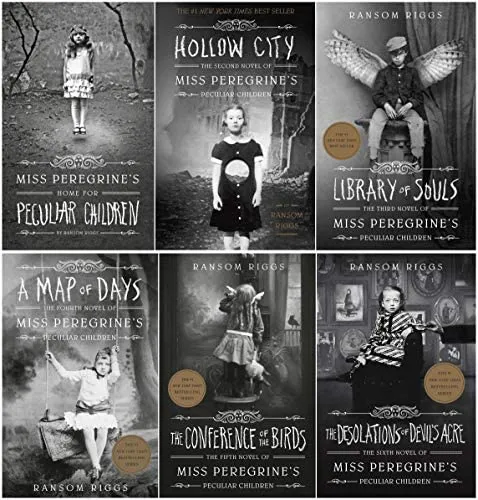
Opinions and Perspectives
I love how the book goes into so much more detail about Jacob's trauma. The film barely scratches the surface of his psychological struggles.
The age changes in the film really bothered me, especially making Bronwyn younger. It completely changes the dynamic between the characters.
I actually preferred Emma having the air powers in the movie. It made more visual sense cinematically than fire would have.
You're missing the point though. Emma's fiery personality matched her fire powers perfectly in the book. The movie totally watered down her character.
I never knew Millard spent 27 years documenting everything that happened in the loop. That's such an interesting detail they left out.
Does anyone else wish they had kept Enoch's original Cockney accent? The Scottish accent was fine but it feels like they changed it just because of the actor.
The technical terms for peculiar beings are fascinating. I wish the film had included more of the mythology and terminology.
What threw me off most was how they changed Dr. Golan's role. Making him the main villain instead of just a lackey completely altered the story's dynamic.
I found it interesting that in the book Jacob's family owns a chain of stores. Adds another layer to his character that we missed in the film.
Seeing Jacob truly struggle with leaving his family behind would have made for a much more compelling ending than the neat wrap-up we got in the film.
Anyone else think it was a missed opportunity not showing Horace's nightmarish visions? Could have been perfect for Burton's style.
The movie Hollowgasts being giant monsters feels like such a Hollywood decision. The book versions sound much creepier.
I understand why they made the changes for the film, but I wish they'd stuck closer to the source material.
The book's ending sounds so much more interesting! Why did they have to give us a typical happy Hollywood ending?
I had no idea Fiona was supposed to be Irish with a thick accent. That would have added such a fun dynamic to the group.
Honestly the movie feels like it barely scratched the surface of the peculiar world Riggs created.
The relationship between Hugh and Fiona sounds much sweeter than the Olive-Enoch dynamic they created for the film.
I'm honestly disappointed they didn't explore more of the Old Peculiar Language in the film. That sounds fascinating.
The fact that Wights don't actually have powers in the book makes them more interesting villains. They have to rely on cunning instead of supernatural abilities.
Jacob killing the Hollowgast alone sounds like such a powerful character moment. Shame we missed that in the film.
Totally agree about Emma. Her character lost so much depth in the translation to screen.
Claire being shy about her peculiarity makes more sense than how they portrayed her in the film.
The twins are even more mysterious in the book! I kind of like that we never learn their peculiarity.
It's fascinating how much of Jacob's family dynamic was left out of the film. Really changes our understanding of his character.
The book version of Millard running around nude all the time would have been hilarious to see on screen!
